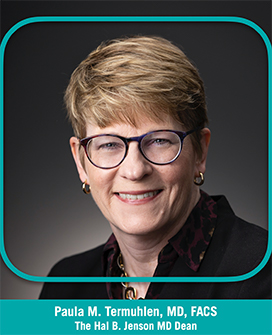
In this month’s installment of Dean Termuhlen’s Take On …, Dr. Paula Termuhlen discusses volunteerism as an important piece of WMed's culture.

WMed offers volunteer opportunities to faculty, staff, students, residents, and fellows. Why is it important for the medical school to encourage volunteering in the community?
We’re designed as a community-based medical school, and the community helped us launch in our first 10 years. It’s important that we’re able to give back to them in a way that volunteering helps us do.
What opportunities does WMed give to staff to volunteer?
Since 2020, we have offered every full-time WMed employee eight paid hours a year to volunteer in our community. We encourage employees to participate in a variety of events to support our non-profit public charities and private foundations, and governmental agencies to help those organizations meet community needs.
Our employees have participated in community events such as the holiday party for the Boys & Girls Club of Greater Kalamazoo, Kalamazoo Gospel Ministries’ toy drive, and the annual fundraiser at Kalamazoo Loaves and Fishes.
In addition, we have helped area organizations with seasonal needs, such as holiday decorating at Friendship Village, recording inventory for the First Day Shoe Fund, youth tutoring with Men of Purpose and building houses with Kalamazoo Valley Habitat for Humanity. We also have gathered teams to participate in events such as the Gryphon Place Suicide Prevention Walk.
How does the medical school curriculum encourage students to volunteer?
Every September, first-year students at WMed spend a day in partnership with community organizations and developing teamwork and leadership skills through their Day of Service. During this day or days, our students spend time in the community helping local non-profit organizations at more than 20 sites, and in turn, they learn about the needs of the Kalamazoo community. We have partnerships with the Cheff Therapeutic Riding Center, the Gilmore Healing Centers, Habitat for Humanity, Kalamazoo Literacy Council, and Kalamazoo Loaves and Fishes, among others.
In addition, our students serve our community by operating as medical first responders at Western Michigan University home football games in partnership with Life EMS. Anywhere from 12 to 14 students attend and help provide immediate care to anyone in need with support from our resident physicians, our EMS fellow, and Department of Emergency Medicine faculty. Our students can help 20 or more patients at WMU games with larger crowds.
Another way our students volunteer is through our Early Introduction to Health Careers pathway programs. These programs provide health career exposure to underrepresented elementary, middle, and high school students through hands-on, team-based learning lessons and activities. WMed students and faculty members facilitate the mentoring and research for these activities.
WMed is one of five institutions from across the country to be selected as a recipient of the 2023 AAMC Nurturing Experiences for Tomorrow’s Community Leaders (NEXT) Grant. How will this $40,000 grant enhance the medical school’s efforts in the community?
This is a great opportunity to help us expand our Engagement and Discovery course for students and to continue our work in being a catalyst for addressing racism and advancing health equity in our community.
We will use this money to fund an initiative in a partnership with Eliminating Racism and Creating and Celebrating Equity (ERACCE) to improve our students’ understanding of racism as a social driver of health and to equip our students to address health inequities in their careers as physicians. This work will raise our visibility and will signal that we are genuine about our work related to health equity. We see that facing racism is part of being able to help us achieve health equity.
How does volunteerism relate to WMed’s vision to create health equity for all in Southwest Michigan?
Volunteerism is our way of contributing to the heavy lift of our community to ensure access and to improve education, which are key components of health equity. Sometimes that access, like with our students who are medical first responders, literally provides point of care at no cost if someone needs to be evaluated for a medical emergency. In addition to that, we have a variety of initiatives related to hunger and the unhoused that go to helping our community tackle some of our biggest challenges.
Who would you like to recognize for your hat tip?
I want to recognize the WMed students in our Garden Interest Group and their faculty advisor, Erik Larson, PhD, vice chair and a professor in our Department of Biomedical Sciences. This group is embodying the spirit of volunteerism by taking the fruits of their labor and providing food for those who are hungry in our community. In addition, they’ve created ways to invite others into the work by setting up their table and accepting contributions for a mini farmer’s market on our W.E. Upjohn M.D. Campus. This aligns very well with our health equity mission because healthy eating and making sure people have access to healthy food improves health outcomes. Proceeds from the food they sell goes to Kalamazoo Loaves and Fishes, a non-profit organization that is working to end hunger in our community.
Dean Termuhlen’s Take On ... is a monthly message from our dean to discuss topics of importance to WMed, medical school stakeholders, and the communities that make up Southwest Michigan. Is there a topic you would like to hear Dean Termuhlen’s take on? Let us know by sending a message to office.dean@wmed.edu.

